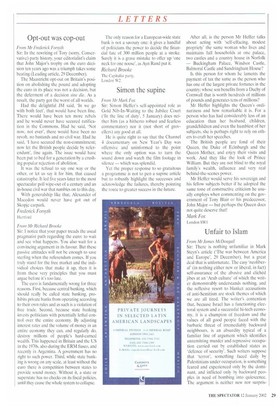Opt-out was cop-out
From Mr Frederick Forsyth Sir: In the rewriting of Tory (sorry, Conservative) party history, your editorialist's claim that John Major's trophy on the euro decision ten years ago was a triumph takes some beating (Leading article, 29 December).
The Maastricht opt-out on Britain's position on abolishing the pound and adopting the euro in its place was not a decision, but the deferment of a decision sine die. As a result, the party got the worst of all worlds.
Had the delightful JM said, 'In we go with both feet', that would have been fine. There would have been ten more rebels and he would never have secured ratification in the Commons. Had he said, Not now, not ever', there would have been no revolt, no bastards and no civil war. Had he said, 'I have secured the non-commitment; now let the British people decide by referendum', fine again. The issue would have been put to bed for a generation by a crushing popular rejection of abolition.
It was the refusal to say one way or the other, or let us say it for him, that caused catastrophe. It led five years later to the most spectacular poll wipe-out of a century and an in-house civil war that rumbles on to this day.
With generalship like that, Alexander of Macedon would never have got out of Skopje carpark.
Frederick Forsyth
Hertford From Mr Richard Brooke Sir: I notice that your paper treads the usual pragmatist path regarding the euro: to wait and see what happens. You also wait for a convincing argument in its favour. But these passive attitudes will not be enough to save sterling when the referendum comes. If you truly stand for the free market and the individual choices that make it up, then it is from these very principles that you must argue before it's too late.
The euro is fundamentally wrong for three reasons. First, because central banking, which should really be called state banking, prohibits private banks from operating according to their own rules and as such is a violation of free trade. Second, because state banking invests politicians with potentially lethal control over the entire economy. By adjusting interest rates and the volume of money in an entire economy they can, and regularly do, destroy millions of people's hard-earned wealth. This happened in Britain and the US in the 1970s, also during the ERM fiasco, and recently in Argentina. A government has no right to such power. Third, while state banking is wrong on any scale, at least without the euro there is competition between states to provide sound money. Without it, a state or superstate has no checks on its fiscal policies, until they cause the whole system to collapse. The only reason for a European-wide state bank is not a savoury one: it gives a handful of politicians the power to decide the financial fate of 300 million people at a stroke. Surely it is a grave mistake to offer up 'one neck for one noose', as Ayn Rand put it.
Richard Brooke
The Capitalist party, London W2


























































 Previous page
Previous page